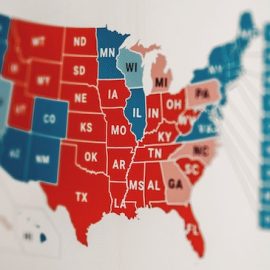
This is a free excerpt from one of Shortform’s Articles. We give you all the important information you need to know about current events and more.
Don't miss out on the whole story. Sign up for a free trial here .
What is the origin of fascism? What are the common traits? How does fascism arise in society?
Fascism is defined as a far-right, authoritarian, and repressive political philosophy or system. Historically, fascist ruling parties led to widespread poverty, people living in fear, and the loss of basic human rights.
Keep reading to learn the origin of fascism, its common traits, and how it arises in a society.
The Origins of Fascism
The origin of fascism began after World War I as the brainchild of Italian dictator Benito Mussolini. From Italy, fascist ideology quickly spread to several other countries in Europe—most notably Nazi Germany—as well as to Japan, Argentina, and other places around the world.
The word fascism comes from the Roman fasces, meaning a bundle of wooden rods tied around an ax. The fasces symbolizes unity and strength: One rod could be snapped easily, but tied together they become nearly unbreakable. In ancient Rome, the fasces was also a symbol of office and a tool of punishment—rods to beat lawbreakers and an ax to execute the worst offenders.
How Fascism Arises
In addition to recognizing the origins of fascism, it’s helpful to know what conditions tend to give rise to it. Such an extreme political system won’t find traction during normal times; totalitarian systems like fascism arise because scared and desperate people seek strong leadership and clear direction to give them hope for the future.
One interpretation of fascism, made popular by leading Marxists such as Leon Trotsky, is that fascism appears when capitalism collapses. In other words, when a capitalist nation faces a severe economic crisis or political crisis (such as Germany and Italy, respectively, faced after World War I), the government will naturally turn to fascism as a means of finding stability and maintaining control.
However, others believe that fascism is not a desperate attempt to prop up a collapsing capitalist society, but is in fact a revolution against global capitalism. Capitalism, seeking maximum efficiency and profit, naturally tends toward globalization. Therefore, fascism—which, remember, features extreme nationalism and xenophobia—could be a pushback against that trend as people try to reclaim “traditional” values and beliefs.
Either way, a frightened and angry populace is perhaps the most crucial predictor of fascism. Whether their country is facing an economic crisis or they fear their culture is being overrun by outside forces, fascism takes root in places where people are desperate for stability, strong leadership, and assurance that their beliefs and traditions will be protected.
The Common Traits of Fascism
In addition to understanding the origin of fascism, it’s important to also know the common traits associated with a fascist regime. While the specifics have varied from country to country, fascism can be identified by several common elements:
- Dictatorship: One of the central tenets of fascism is that the government must be led by a single person who wields absolute authority. There are no checks and balances between branches of government; the leader’s word is law. If elections are held at all, they will be rigged to ensure that the leader and his supporters maintain power.
- Extreme nationalism and xenophobia: Fascists push the belief that their country and their people are the best in the world; all other nations and peoples are inferior. Both the government and private citizens are expected—if not required—to show their pride in the country and their belief in its supremacy. Common ways of doing this are by displaying flags, reciting slogans, and supporting the military without question.
- Obsession with order and security: Fascist nations prize law, order, and safety above all else. This leads to repressive laws and harsh punishments for breaking them, enforced by secret police forces operating with little oversight or accountability. This tendency goes hand in hand with a disdain for human rights (which are considered irrelevant compared to national security) and a disdain for education and the arts (which give people “dangerous” or “unpatriotic” ideas).
- Scapegoating: Fascists invent outside enemies in order to unite their people and deflect blame for any hardships they face. The scapegoat is inevitably minority groups and/or the fascist party’s political opponents—perhaps most infamously, Adolf Hitler blamed Jews (among other minority groups) for Germany’s problems and thereby started the Holocaust.
- Joining of church and state: In a fascist government, the ruling party ties itself to the nation’s dominant religion. Party members claim to champion that religion and its practitioners and to protect them from unbelievers and heretics. However, the party’s policies and actions are often incompatible with the actual tenets of that religion.
- Mutual interest of government and corporations: Corporations are encouraged to pursue maximum productivity and profit in order to strengthen the national economy. The corporations are allowed to operate freely, with few if any laws protecting workers’ rights. This goes hand-in-hand with widespread corruption; there are also no restrictions on political donations, so businesses can bribe politicians for favorable treatment. The rights of workers are brutally repressed in favor of maximum productivity and profit.
- Control of media: The ruling party controls the news and other media, either overtly or covertly, in order to manipulate information and public opinion.
In summary, fascism is a far-right system where a charismatic dictator wields the combined power of the government, corporations, religion, and media to maintain absolute control over the people. As Mussolini himself wrote in his Doctrine of Fascism:
“Thus understood, Fascism, is totalitarian, and the Fascist State—a synthesis and a unit inclusive of all values—interprets, develops, and potentates the whole life of a people. No individuals or groups (political parties, cultural associations, economic unions, social classes) outside the State.”
Today, no countries and few, if any, political parties describe themselves as fascist; however, the extent to which certain political movements, parties, and governments evoke fascist ideas and policies is open to debate.

Want to fast-track your learning? With Shortform, you’ll gain insights you won't find anywhere else .
Here's what you’ll get when you sign up for Shortform :
- Complicated ideas explained in simple and concise ways
- Smart analysis that connects what you’re reading to other key concepts
- Writing with zero fluff because we know how important your time is






